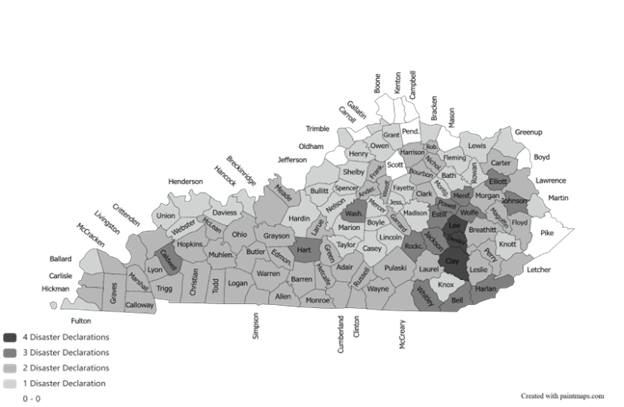The U.S. Economic Development Administration (EDA) is currently accepting applications for its FY25 Disaster Supplemental program, offering $1.447 billion in funding to help communities recover from major disasters that occurred in 2023 and 2024 (including hurricanes, wildfires, tornadoes, and floods). Due to four qualifying disaster declarations across 2023 and 2024, 110 Kentucky counties are eligible for this funding cycle.
Application Period
Applications are accepted on a rolling basis until funds are exhausted or a new Notice of Funding Opportunity (NOFO) is released. Because this is first-come, first-served funding, Kentucky organizations are encouraged to submit applications as soon as possible.
Award ceiling: $50M | Award floor: $0
Matching funds are required but qualifies for the Kentucky Cabinet for Economic Development's GRANT Match.
Three Strategic Funding Pathways
Readiness – Non-construction projects to build capacity for future recovery
Readiness Path projects are intended to help communities build the capacity needed to successfully plan and implement long-term economic recovery and development efforts. These projects focus on strengthening a community’s ability to design, fund, and manage future initiatives. These grants support a wide range of activities that strengthen local capacity and readiness. Examples of supported activities include:
- Strategic planning for economic recovery and development
- Technical assistance to assess needs and identify opportunities
- Community engagement and stakeholder coordination
- Feasibility studies or market analyses
- Early-stage project development work, such as site assessments or preliminary design
- Predevelopment costs related to future infrastructure or capital projects
For more information about the Readiness Pathway, click here.
Implementation – Projects addressing post-disaster economic challenges
Implementation Path grants support projects that strengthen a community’s resilience to future disasters and restore or enhance critical public infrastructure impacted by past natural disasters. These grants aim to restore long-term economic activity, reduce future vulnerabilities, and accelerate economic diversification through strategic investments in key industries. Examples of eligible Implementation Path projects include (but are not limited to):
- Replacement, repair, or enhancement of critical public infrastructure
- Construction or expansion of workforce training facilities
- Costs related to establishing or growing workforce development programs, including Registered Apprenticeship Programs and equipment procurement
- Capitalization or recapitalization of revolving loan funds (RLFs)
- Development or expansion of commercialization centers or proof-of-concept labs
- Initiatives to attract or expand foreign direct investment, trade, or export activity
- Projects that catalyze large-scale private sector or industry investment
For more information about the Implementation Pathway, click here.
Industry Transformation – Large, multi-component initiatives to transform regional economies
Industry Transformation Path grants are designed to accelerate the growth of emerging or existing industry clusters in eligible regions. Led by coalitions of regional partners, these projects aim to scale strategic industries, attract major private and public investment, and strengthen long-term economic resilience. EDA expects applicants to propose projects similar to those under the Implementation Path, such as:
- Construction or repair of critical infrastructure, including broadband
- Expansion of workforce training facilities and programs, including equipment purchases
- Capitalization or recapitalization of revolving loan funds (RLFs)
- Development of commercialization or proof-of-concept centers
- Initiatives to grow foreign direct investment, trade, or exports
- Projects aimed at attracting large-scale private sector investment
For more information about the Industry Transformation Pathway, click here.
Kentucky counties eligible for funding

Adair
Allen
Anderson
Ballard
Barren
Bath
Bell
Bourbon
Boyle
Bracken
Breathitt
Breckinridge
Bullitt
Butler
Caldwell
Calloway
Carlisle
Carter
Casey
Christian
Clark
Clay
Clinton
Crittenden
Cumberland
Daviess
Edmonson
Elliott
Estill
Fayette
Fleming
Floyd
Franklin
Fulton
Gallatin
Garrard
Grant
Graves
Grayson
Green
Greenup
Hancock
Hardin
Harlan
Harrison
Hart
Henderson
Henry
Hickman
Hopkins
Jackson
Jefferson
Jessamine
Johnson
Knott
Knox
Larue
Laurel
Lawrence
Lee
Leslie
Letcher
Lewis
Lincoln
Livingston
Logan
Lyon
Madison
Magoffin
Marion
Marshall
Martin
McCracken
McCreary
McLean
Meade
Menifee
Mercer
Metcalfe
Monroe
Montgomery
Morgan
Muhlenberg
Nelson
Nicholas
Ohio
Owen
Owsley
Perry
Powell
Pulaski
Robertson
Rockcastle
Rowan
Russell
Shelby
Simpson
Spencer
Taylor
Todd
Trigg
Trimble
Union
Warren
Washington
Wayne
Webster
Whitley
Wolfe
Woodford